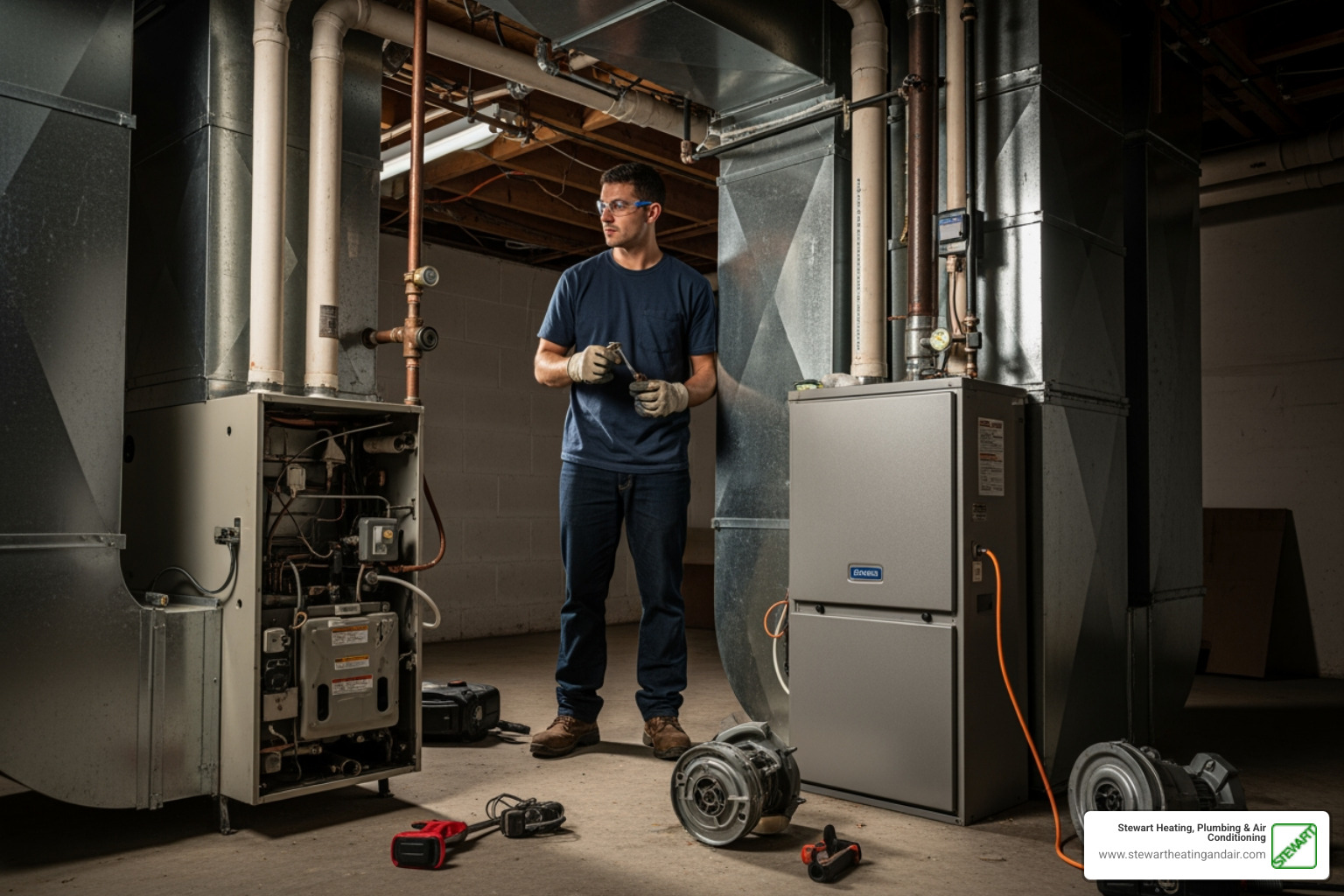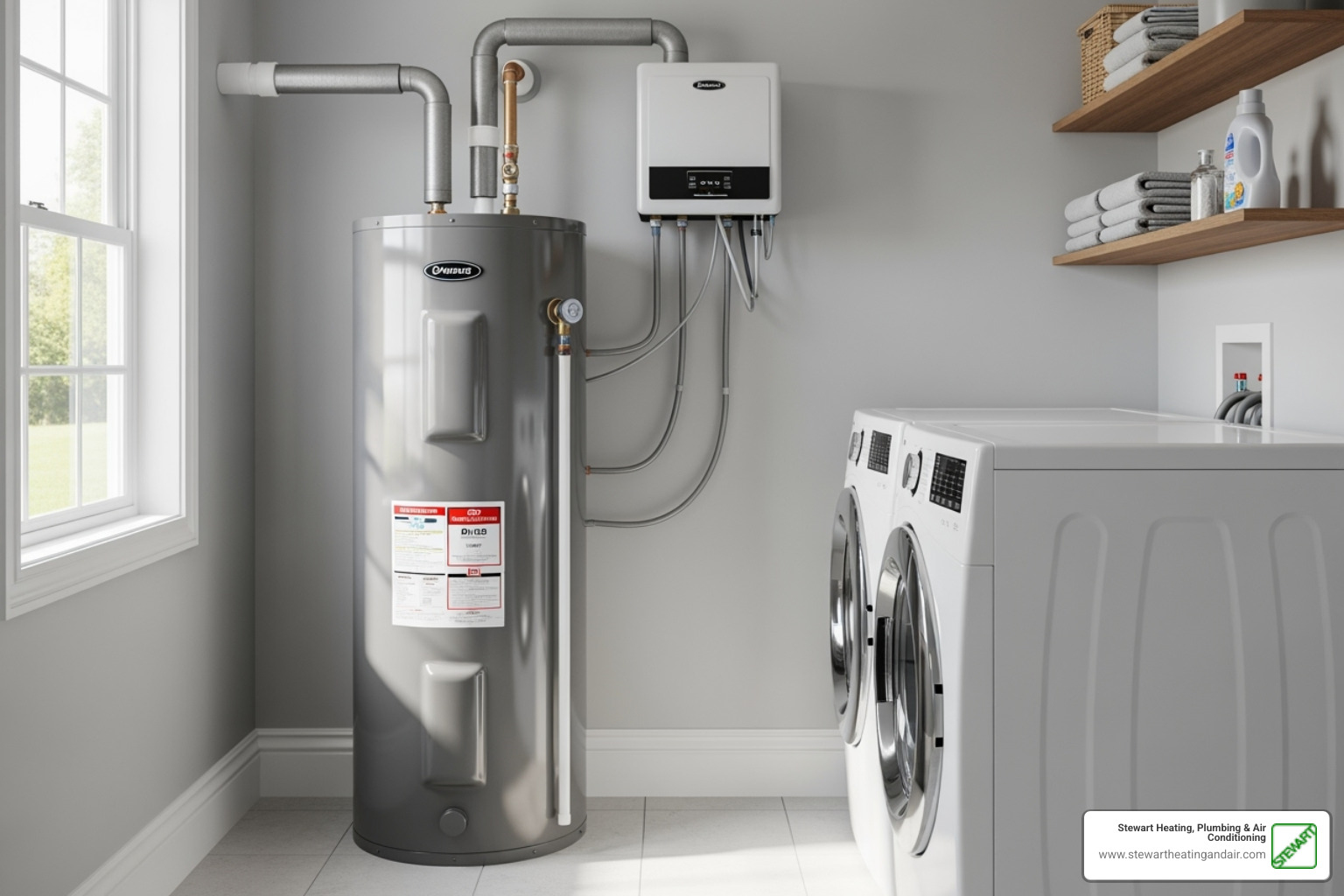
Why Reliable Hot Water Matters for Your Contra Costa County Home
A reliable residential water heater contra costa county homeowners need for daily comfort can become a source of stress when it fails. From inconsistent temperatures to strange noises, a struggling water heater disrupts your entire household. Choosing the right system is essential, especially with new Bay Area regulations starting in 2027 and a range of energy-efficient technologies available. Understanding your household's needs and local requirements is the first step to ensuring you have reliable hot water. Today's technology offers more efficient and cost-effective options than ever, especially with financial incentives available for high-efficiency electric models.
Quick Answer: Your Residential Water Heater Options in Contra Costa County
- Traditional Tank Water Heaters: Store 30-80 gallons; gas or electric; lowest upfront cost; 8-12 year lifespan
- Tankless Water Heaters: Endless hot water on demand; 30-40% more efficient; 15-20 year lifespan; higher initial investment
- Heat Pump Water Heaters: 3-4x more efficient; pull heat from air; eligible for significant rebates; best long-term savings
- Key Consideration: Starting 2027, new natural gas water heater installations will be banned in Contra Costa County (repairs to existing units still allowed)
- Financial Help Available: Federal rebates up to $1,750, tax credits up to $2,000, and BayREN rebates up to $2,000 for heat pump models
For homeowners concerned about preventing costly breakdowns and maximizing long-term savings, understanding these options is the first step. Learn more about water heater services throughout Contra Costa County, or contact Stewart Heating, Plumbing & Air Conditioning for a professional assessment of your home's needs.
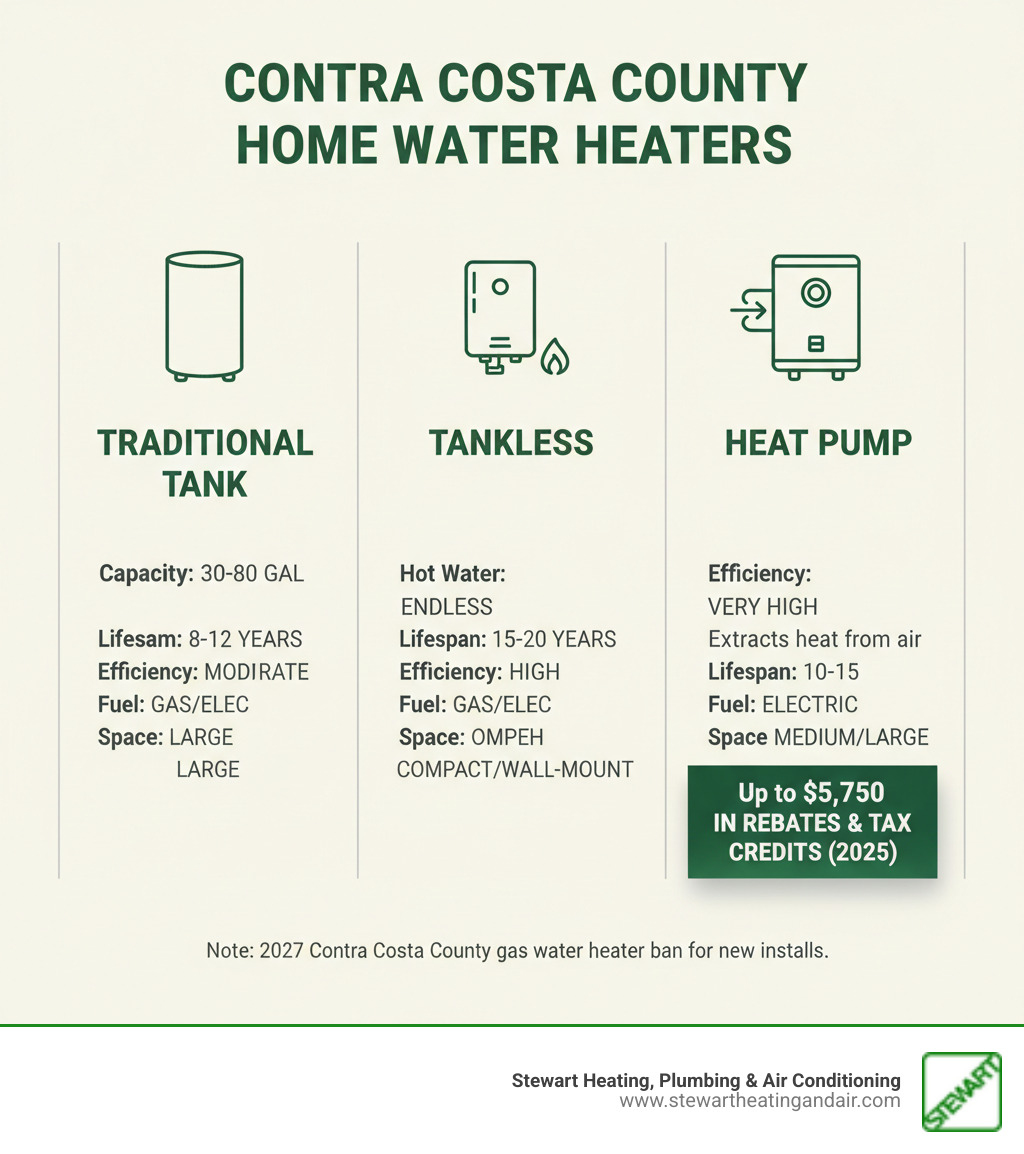
Understanding Your Water Heater Options in Contra Costa County
When choosing a water heater, you have more options than the simple tank in your garage. Today's technology offers solutions that can save money, free up space, and deliver hot water more efficiently. Let's break down the three main types of water heaters available to residential water heater Contra Costa County homeowners.
Traditional Storage Tank Water Heaters
The most common system is the traditional storage tank water heater. An insulated tank holds 30 to 80 gallons of water, heating it with a gas burner or electric element and keeping it ready for use. Gas models often heat water faster, while electric models can be simpler to install. You can find more info about electric water heaters and more info about gas water heaters to understand the differences.
The primary advantage is a lower upfront cost, making them a popular choice for budget-conscious replacements. However, their main drawback is "standby heat loss"—the tank constantly uses energy to keep the stored water hot, which wastes energy and increases utility bills.
Tankless (On-Demand) Water Heaters
Tankless water heaters provide endless hot water by heating it on demand. When you turn on a tap, cold water flows through the unit and is instantly heated. This process eliminates standby heat loss, making them 30-40% more energy-efficient than traditional tanks. Their compact, wall-mounted design also saves valuable floor space.
While the initial investment is higher, the long-term energy savings can be significant. A key consideration is flow rate (GPM), which determines how many fixtures can use hot water simultaneously. A professional assessment ensures your unit is sized correctly for your household's needs. Ready to learn more? We've put together a complete guide to tankless water heater benefits, and you can find more info about tankless water heater installation specific to our service area.
Heat Pump (Hybrid) Water Heaters
For maximum energy efficiency, especially with the 2027 natural gas regulations in mind, consider a heat pump water heater. These systems operate like a refrigerator in reverse, pulling heat from the surrounding air and transferring it to the water in the tank. This process makes them three to four times more efficient than standard electric models, potentially saving homeowners significant money on their utility bills. As a bonus, they also cool and dehumidify the space they occupy.
Though they run on electricity, their method of moving heat rather than creating it is far more efficient. The moderate Contra Costa County climate is ideal for these systems. Furthermore, heat pump models qualify for the most generous financial incentives, making them an attractive long-term investment. You can learn more about heat pump water heaters on our blog.
To help you compare your options at a glance, here's how the three main types stack up:
| Feature | Traditional Tank | Tankless (On-Demand) | Heat Pump (Hybrid) |
|---|---|---|---|
| Lifespan | 8-12 years | 15-20 years | 10-15 years |
| Energy Efficiency | Moderate (with standby loss) | High (on-demand) | Very High (extracts heat) |
| Upfront Cost | Lowest | Highest | Medium-High |
| Space Required | Large (floor space) | Small (wall-mounted) | Medium-Large (floor space, some clearance) |
| Hot Water Supply | Limited (tank capacity) | Endless (continuous) | Limited (tank capacity, but very efficient recovery) |
Choosing the right residential water heater Contra Costa County system means balancing these factors against your household's needs and budget.
Is It Time for a Repair or Replacement?
Recognizing the warning signs that your system needs attention can save you from a catastrophic failure and help you make a smart decision about whether to repair or replace. For residential water heater Contra Costa County homeowners, being proactive means avoiding emergencies when you need hot water most.
Common Warning Signs
Your water heater will often show signs of trouble before it fails completely. Be aware of these common warnings:

- No hot water or fluctuating temperatures: If you run out of hot water quickly or the temperature is inconsistent, it could signal a failing heating element or thermostat.
- Strange noises: Rumbling or popping sounds usually indicate sediment buildup at the bottom of the tank, which reduces efficiency and can cause damage.
- Discolored or smelly water: Rusty or cloudy water suggests internal tank corrosion, while a "rotten egg" smell points to bacterial growth.
- Visible leaks or corrosion: Any water pooling around the unit or rust on the tank or its connections requires immediate attention to prevent a major leak.
- Rising utility bills: A sudden increase in energy costs can mean your water heater is losing efficiency and working harder to heat water.
If you notice these issues, our guide to common hot water heater problems can help. Professional water heater repair in Concord can often fix the problem, but sometimes replacement is the better option.
Average Lifespan and When to Replace
Knowing your water heater's average lifespan helps you plan for a replacement.
- Conventional tank water heaters typically last 8-12 years.
- Tankless water heaters can last 15-20 years or more with proper maintenance.
As a unit approaches the end of its lifespan, the age-versus-repair-cost equation changes. If a major repair is needed on an older unit, investing that money in a new, more efficient system is often the smarter financial choice. Frequent repairs are another clear sign that it's time for a replacement. Planning for a replacement proactively prevents the stress and potential water damage of a catastrophic failure and allows you to choose the best new system for your home. Our water heater replacement services help homeowners make a smooth transition.
Navigating the Bay Area's Shift to Electric Water Heaters
For residential water heater Contra Costa County homeowners, understanding new regulations and the financial help available can turn a requirement into an opportunity for a home upgrade.
The Bay Area Natural Gas Ban Explained
The Bay Area Air Quality Management District (BAAQMD) has enacted a rule to improve air quality. Here’s what you need to know:
- Starting January 1, 2027, the sale and installation of new natural gas-powered water heaters will be banned in Contra Costa County.
- This ban does not affect existing units. You can continue to use and repair your current gas water heater.
- The rule only applies when your unit needs a full replacement. At that point, you will need to install an electric model, like a heat pump water heater.
- Propane-powered appliances are exempt from this ban.
You can read the facts about the BAAQMD rule for more details. The good news is that significant financial incentives are available to help with this transition.
Navigating Rebates for Your Residential Water Heater in Contra Costa County
Replacing your water heater is more affordable than ever thanks to substantial rebates and tax credits for high-efficiency electric models. Homeowners can combine several incentives:
- Federal Rebates: The Inflation Reduction Act (IRA) offers up to $1,750 for a new heat pump water heater.
- Federal Tax Credits: The IRA also provides a tax credit of 30% of the project cost, up to $2,000.
- Local Rebates: The Bay Area Regional Energy Network offers up to $2,000 for heat pump water heater upgrades.
- Electrical Panel Upgrades: For older homes that need an electrical panel upgrade, rebates up to $4,000 may be available.
The Switch is On campaign offers an easy-to-use tool to find local incentives here. These programs can significantly reduce the cost of upgrading to a more efficient system, making it a smart financial decision.
Your Guide to Residential Water Heater Contra Costa County Services
Making smart decisions about your water heater means understanding your home's needs, keeping your system running smoothly, and knowing when to call the experts. For residential water heater Contra Costa County homeowners, getting these fundamentals right means years of reliable hot water.
Choosing the Right Residential Water Heater in Contra Costa County
Choosing the right water heater involves matching a system to your family's specific hot water habits. A professional assessment considers several key factors:
- Hot Water Usage: We analyze your peak demand to determine the correct size. For tank models, this is the First Hour Rating (FHR); for tankless, it's the Gallons Per Minute (GPM).
- Household Size and Habits: A family that uses multiple hot water appliances at once has different needs than one that spreads usage out.
- Fuel Type: Your choice between gas, electric, or propane will be influenced by your home's existing connections and the upcoming Bay Area regulations favoring electric options.
- Energy Efficiency: The Uniform Energy Factor (UEF) rating indicates how efficiently a unit operates. A higher UEF means lower long-term energy costs.
- Local Climate: Contra Costa County's seasonal temperature swings affect performance, especially for heat pump models which thrive in our climate.
A professional evaluation ensures you get a system that is perfectly sized and suited for your home.
The Importance of Regular Maintenance
Regular maintenance is the best way to extend your water heater's lifespan, improve efficiency, and prevent unexpected breakdowns. An annual service visit is crucial for keeping your system in peak condition. Key maintenance tasks include:
- Annual sediment flushing: Removing mineral buildup from the bottom of the tank prevents damage and restores efficiency.
- Anode rod inspection: This sacrificial rod protects your tank from rust. We check and replace it as needed to prevent tank corrosion.
- Pressure relief valve testing: We ensure this critical safety feature is working correctly to prevent dangerous pressure buildup.
Professional maintenance catches small issues before they become costly emergencies. Our plumbing maintenance program in Contra Costa County makes it easy to stay on schedule. For more tips, see our guide to water heater maintenance.
Why Professional Installation and Repair is Crucial
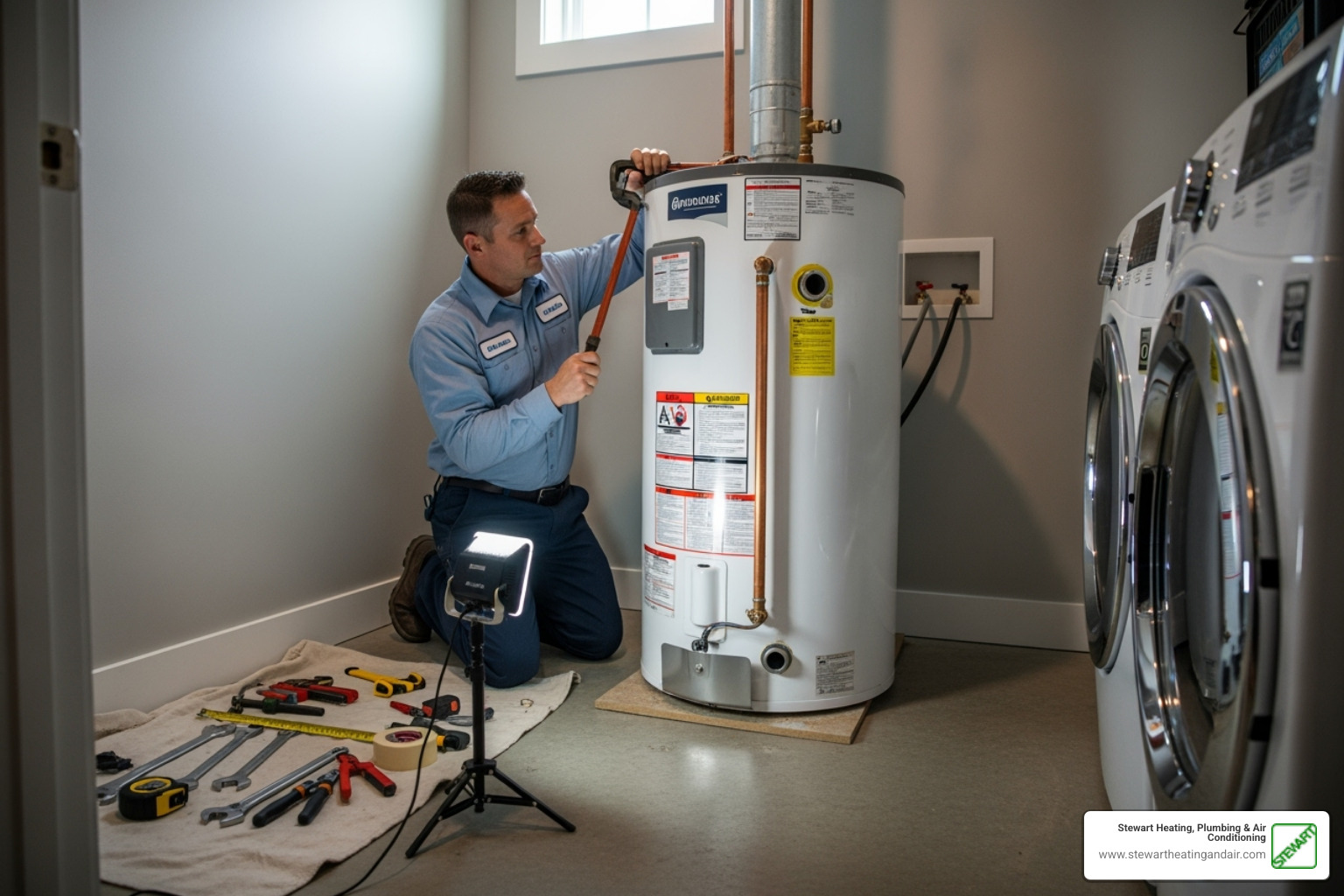
While a DIY installation might seem tempting, professional installation and repair are crucial for safety, performance, and compliance. Here's why you should always hire a licensed technician:
- Safety: Water heaters involve gas lines, high-voltage electricity, and high temperatures. A professional handles these elements safely, preventing risks like gas leaks or electrical fires.
- Code Compliance: Professionals understand and adhere to all local Contra Costa County plumbing and electrical codes, including seismic strapping requirements, ensuring your installation passes inspection.
- Optimal Performance: Proper installation is key to a water heater's efficiency and lifespan. Incorrect sizing or venting can lead to poor performance and premature failure.
- Warranty Protection: Most manufacturer warranties are voided by DIY installation. Professional installation protects your investment.
Mistakes from improper installation are costly and dangerous. Learn more about why you need professional water heater repair and trust our team to do the job right the first time.
Frequently Asked Questions about Water Heaters in Contra Costa County
Here are the most common concerns we hear from residential water heater Contra Costa County homeowners.
How often should a water heater be serviced?
We recommend an annual service check for your water heater. During a service visit, a technician will flush sediment from the tank, inspect the corrosion-preventing anode rod, and test the safety valves. This proactive maintenance extends the unit's lifespan, prevents costly breakdowns, and keeps your energy bills in check.
Can I still repair my gas water heater after the 2027 ban?
Yes. The Bay Area ban starting in 2027 applies only to the sale and new installation of natural gas water heaters. It does not prevent you from repairing your existing gas unit. You can continue to operate and service your current system for its entire lifespan. The rule only comes into effect when your unit needs to be completely replaced, at which point you will need to choose an electric or heat pump model.
What size water heater do I need for my family?
The right size water heater depends on your household's peak hot water usage, not just the number of people. Factors include how many hot water appliances run simultaneously and your family's daily routines. For tank models, we use the First Hour Rating (FHR) to measure capacity. For tankless models, we calculate the required Gallons Per Minute (GPM) flow rate. A professional assessment is the best way to determine the correct size and type of system to ensure you have enough hot water when you need it most.
Your Local Experts for Water Heater Solutions
Choosing the right residential water heater Contra Costa County homeowners need involves navigating new technologies, regulations, and rebates. It can feel overwhelming, but you don't have to do it alone. At Stewart Heating, Plumbing & Air Conditioning, we have served Contra Costa County families for years with a commitment to doing the job right the first time.
Our experienced technicians partner with you to find the perfect solution for your home's needs and budget. We'll help you understand your options, from efficient heat pump systems to tankless models, and maximize available rebates. We stay current on all local codes, including the upcoming 2027 regulations, to ensure your installation is safe, compliant, and optimized for performance. Our high referral rate reflects our dedication to quality work and customer satisfaction. Your comfort and peace of mind are our priority.
Ready to explore your options or schedule service? Learn more about our comprehensive water heater services and let us make your experience seamless and stress-free.

